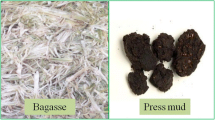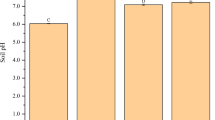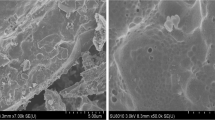Abstract
Sugar industry produces a variety of organic byproducts causing disposal as well as environmental issues. This study investigated the safe use of these byproducts in assessment of soil physicochemical properties and metal accumulation in rice. A field experiment was performed with following treatments: control only NPK (CF), NPK + sugarcane bagasse (SB), NPK + press mud (PM), NPK + sugarcane vinasse (SV), NPK + SB + PM (SB + PM), NPK + SB + SV (SB + SV), NPK + PM + SV (PM + SV), NPK + SB + PM + SV (SB + PM + SV). Total byproduct input was (1.25 t ha−1) as recommended for organic inputs in the local area. The results indicated that integrated use of these amendments with chemical fertilization improved soil properties and rice yield. Organic matter was significantly improved in SB + SV (191.3%), SB + PM + SV (164.4%), and SB + PM (150.9%). Total N was significantly enhanced in SB + SV (193%), SB + PM + SV (166%), and SB + PM (152.5%); extractable P was high in SB (103%), PM + SV (89.7%), and SB + PM (51%); extractable K was significantly improved in PM (39.6%) and SB (33.4%); extractable Zn was significantly enhanced in SB (1172.8%), SV (829.2%) and PM (819.1%) in soil. Rice grain yield was significantly enhanced in SB (213.1%) and PM (208.8%) while combined application also improved the yield with reference to the CF. The application of SB + PM improved N (58.7%), P (27.4%), K (11.5%), and Zn (166.4%) concentration in grain, while metal accumulation was within the permissible limit. Zn concentration was significantly enhanced in SB + PM (166.4%) whereas the concentration of Cd and Pb was significantly reduced with the application of byproducts. Health assessment results showed no harmful effects for humans. Results conclude that these byproducts are good nutrients source and improve soil physicochemical properties without any health hazards.






Similar content being viewed by others
References
Bahadur L, Tiwari DD, Mishra J, Gupta BR (2013) Nutrient management in rice-wheat sequence under Sodic Soil. 61:341–346
Bashir MA, Liu J, Geng Y et al (2020) Co-culture of rice and aquatic animals: an integrated system to achieve production and environmental sustainability. J Clean Prod 249:119310
Bashir MA, Rehim A, Liu J et al (2019) Soil survey techniques determine nutrient status in soil profile and metal retention by calcium carbonate. CATENA 173:141–149. https://doi.org/10.1016/j.catena.2018.10.015
Bashir MA, Wang H, Pan J, et al (2021) Variations in soil nutrient dynamics and their composition in rice under integrated rice-crab co-culture system J Clean Prod 281. https://doi.org/10.1016/j.jclepro.2020.125222
Bhosale PR, Chonde SG, Nakade DB, Raut PD (2012) Studies on physico-chemical characteristics of waxed and dewaxed pressmud and its effect on water holding capacity of soil. Researchgate. net 1:35–41
Canellas LP, Velloso ACX, Marciano CR et al (2003) Propriedades químicas de um Cambissolo cultivado com cana-de-açúcar, com preservação do palhiço e adição de vinhaça por longo tempo. Rev Bras Ciência Do Solo 27:935–944. https://doi.org/10.1590/s0100-06832003000500018
Chen D, Yuan L, Liu Y et al (2017) Long-term application of manures plus chemical fertilizers sustained high rice yield and improved soil chemical and bacterial properties. Eur J Agron 90:34–42. https://doi.org/10.1016/j.eja.2017.07.007
Choi WJ, Ro HM, Chang SX (2004) Recovery of fertilizer-derived inorganic- 15N in a vegetable field soil as affected by application of an organic amendment. Plant Soil 263:191–201. https://doi.org/10.1023/B:PLSO.0000047726.09394.d3
Christofoletti CA, Escher JP, Correia JE et al (2013) Sugarcane vinasse: environmental implications of its use. Waste Manag 33:2752–2761. https://doi.org/10.1016/j.wasman.2013.09.005
Cui Y, Zhu YG, Zhai R et al (2005) Exposure to metal mixtures and human health impacts in a contaminated area in Nanning, China. Environ Int 31:784–790. https://doi.org/10.1016/j.envint.2005.05.025
da Silva A, Rossetto R, Bombecini J et al (2014) Nitrogen mineralization from sugarcane vinasse. J Plant Nutr 37:1227–1236. https://doi.org/10.1080/01904167.2014.888739
Dotaniya M (2012) Crop residue management in rice-wheat crop** system. Lap Lambert Academic Publisher, Saarbrücken, p 116. L Lambert Acad Publ Saarbrücken 116:
Dotaniya ML, Datta SC, Biswas DR et al (2016) Use of sugarcane industrial by-products for improving sugarcane productivity and soil health. Int J Recycl Org Waste Agric 5:185–194. https://doi.org/10.1007/s40093-016-0132-8
Eghball B, Binford GD, Baltensperger DD (1996) Phosphorus movement and adsorption in a soil receiving long-term manure and fertilizer application. J Environ Qual 25:1339–1343. https://doi.org/10.2134/jeq1996.00472425002500060024x
FAO (2000) Food and Agriculture Organization, National Institute of Health and National food nutrition survey. Islamabad, Food balance sheet, Rome
Formann S, Hahn A, Janke L et al (2020) Beyond sugar and ethanol production: value generation opportunities through sugarcane residues. Front Energy Res 8:267
Garcia CFH, Souza RBd, de Souza CP et al (2017) Toxicity of two effluents from agricultural activity: comparing the genotoxicity of sugar cane and orange vinasse. Ecotoxicol Environ Saf 142:216–221. https://doi.org/10.1016/j.ecoenv.2017.03.053
Gautam A, Guzman J, Kovacs P, Kumar S (2021) Manure and inorganic fertilization impacts on soil nutrients, aggregate stability, and organic carbon and nitrogen in different aggregate fractions Arch Agron Soil Sci 1–13. https://doi.org/10.1080/03650340.2021.1887480
Ge KY (1992) The status of nutrient and meal of chinese in the 1990s. Bei**g People’s Hyg Press 415–434
Jackson ML (1960) Soil chemical analysis. Constable and Ltd., London. J Agric Food Chem. https://doi.org/10.1021/jf60096a605
Jamil M, Qasim M, Zia MS (2008) Utilization of pressmud as organic amendment to improve physico-chemical characteristics of calcareous soil under two legume crops. J Chem Soc Pakistan 30:577–583
Kalaivanan D, Hattab KO (2016) Recycling of sugarcane industries byproducts for preparation of enriched pressmud compost and its influence on growth and yield of rice (Oryza sativa L.). Int J Recycl Org Waste Agric 5:263–272. https://doi.org/10.1007/s40093-016-0136-4
Khan S, Cao Q, Zheng YM et al (2008) Health risks of heavy metals in contaminated soils and food crops irrigated with wastewater in Bei**g, China. Environ Pollut 152:686–692. https://doi.org/10.1016/j.envpol.2007.06.056
Kjeldahl J (1883) Kjeldahl. 366–382
Kumar T, Kumar V, Singh G, et al (2007) Effect of pressmud and inorganic fertilizers on yield and nutrient uptake by rice and its residual effect on succeeding wheat and soil fertility in rainfed lowlands. Internat J agric Sci Vol3 No1 January 2007 220–222 Eff 3:2007
Kumar V, Chopra AK (2012) Fertigation effect of distillery effluent on agronomical practices of Trigonella foenum-graecum L. (Fenugreek). Environ Monit Assess 184:1207–1219. https://doi.org/10.1007/s10661-011-2033-7
Leno N, Sudharmaidevi CR (2021) Physicochemical and nutrient release characteristics of a thermochemical organic fertilizer produced from degradable solid waste and its effect on productivity of banana. Commun Soil Sci Plant Anal. https://doi.org/10.1080/00103624.2021.1953054
Li XH, Han XZ, Li HB et al (2012) Soil chemical and biological properties affected by 21-year application of composted manure with chemical fertilizers in a Chinese mollisol. Can J Soil Sci 92:419–428. https://doi.org/10.4141/CJSS2010-046
Lindsay WL, Norvell WA (1978) Development of a DTPA soil test for zinc, iron, manganese, and copper1. Soil Sci Soc Am J 42:421. https://doi.org/10.2136/sssaj1978.03615995004200030009x
McGeorge WT (1954) Diagnosis and improvement of saline and alkaline soils. Soil Sci Soc Am J 18:348. https://doi.org/10.2136/sssaj1954.03615995001800030032x
Mitran T, Mani PK (2017) Effect of organic amendments on rice yield trend, phosphorus use efficiency, uptake, and apparent balance in soil under long-term rice-wheat rotation. J Plant Nutr 40:1312–1322. https://doi.org/10.1080/01904167.2016.1267205
Mohamed I, Ahamadou B, Li M et al (2010) Fractionation of copper and cadmium and their binding with soil organic matter in a contaminated soil amended with organic materials. J Soils Sediments 10:973–982. https://doi.org/10.1007/s11368-010-0199-1
Muqing Q (2012) Dynamic Variations of soil N elements in rice-frog ecosystems. J Shaoxing Univ (Natural Sci 32:48–51
Naveed S, Rehim A, Imran M et al (2018) Effect of distillery spentwash fertigation on crop growth, yield, and accumulation of potentially toxic elements in rice. Environ Sci Pollut Res 25:31113–31124. https://doi.org/10.1007/s11356-018-3067-y
Olsen SR (1954) Estimation of available phosphorus in soils by extraction with sodium bicarbonate. US Dep Agric Circ 939:1–19
Pakistan ES of (2018) Agricultural Statistic of Pakistan
Pan G, Zhou P, Li Z et al (2009) Combined inorganic/organic fertilization enhances N efficiency and increases rice productivity through organic carbon accumulation in a rice paddy from the Tai Lake region, China. Agric Ecosyst Environ 131:274–280. https://doi.org/10.1016/j.agee.2009.01.020
Prado RDM, Caione G, Campos CNS (2013) Filter cake and vinasse as fertilizers contributing to conservation agriculture Appl Environ Soil Sci 2013https://doi.org/10.1155/2013/581984
Ramzani PMA, Khalid M, Naveed M et al (2016) Integrating the organic amendment with iron fertilization for improving productivity and Fe biofortification in rice under acidified calcareous soil. Pakistan J Agric Sci 53:407–417. https://doi.org/10.21162/PAKJAS/16.5116
Rashid A (1986) Map** zinc fertility of soils using indicator plants and soil analyses (Doctoral dissertation).
Raza QA, Bashir MA, Rehim A et al (2021) Achieving sustainable rice production with the application of sugarcane industrial by-products. Pakistan J Agric Agric Eng Vet Sci 37:1–10. https://doi.org/10.47432/2021.37.1.1
Razzaq A (2001) Assessing sugarcane filter cake as crop nutrients and soil health ameliorant. Pakistan Sugar J 16:15–17 ST-Assessing sugarcane filter cake as cro
Reitemeier RF (1963) Methods of analysis for soils, plants, and waters. Soil Sci Soc Am J 27:iv. https://doi.org/10.2136/sssaj1963.03615995002700010004x
Richards LA (1954) Diagnosis and improving of saline and alkaline soils. In: Agric. Handbook. 60 US, Salinity Laboratory Staff
Sha Z, Chu Q, Zhao Z et al (2017) Variations in nutrient and trace element composition of rice in an organic rice-frog coculture system. Sci Rep 7:1–10. https://doi.org/10.1038/s41598-017-15658-1
Shinde B, Takate A, Journal APU (1994) Mineralization of nitrogen from spent wash (distillery effluent) solids and spent wash-press mud compost. MAHARASHTRA AGRI UNIV 19:441–442
Singh R, Das R, Sangwan S et al (2021) Utilisation of agro-industrial waste for sustainable green production: a review. Environ Sustain 1:1–18. https://doi.org/10.1007/s42398-021-00200-x
Sultana MS, Rahman MH, Rahman MS et al (2015) Effect of integrated use of vermicompost, pressmud and urea on the nutrient content of grain and straw of rice ( Hybrid Dhan Hira 2). Citeseer 5:765–770
Thind HS, Yadvinder-Singh B-S et al (2012) Land application of rice husk ash, bagasse ash and coal fly ash: effects on crop productivity and nutrient uptake in rice-wheat system on an alkaline loamy sand. F Crop Res 135:137–144. https://doi.org/10.1016/j.fcr.2012.07.012
Toscano Miranda N, Lopes Motta I, Maciel Filho R, Wolf Maciel MR (2021) Sugarcane bagasse pyrolysis: a review of operating conditions and products properties. Renew Sustain Energy Rev 149:111394
Ugulu I, Akhter P, Iqbal Khan Z et al (2021) Trace metal accumulation in pepper (Capsicum annuum L.) grown using organic fertilizers and health risk assessment from consumption. Food Res Int 140:109992. https://doi.org/10.1016/j.foodres.2020.109992
USEPA (2002) United States of America Environmental Protection Agency Preliminary remediation gols
Walkley A (1947) A critical examination of a rapid method for determining organic carbon in soils—effect of variations in digestion conditions and of inorganic soil constituents. Soil Sci 63:251–264. https://doi.org/10.1097/00010694-194704000-00001
Wang X, Sato T, **ng BTS (2005) Health risks of heavy metals to the general public in Tian**, China via consumption of vegetables and fish. Sci Total Env 350:28–37
Wei Z, Hoffland E, Zhuang M, et al (2021) Organic inputs to reduce nitrogen export via leaching and runoff: a global meta-analysis Environ Pollut 118176. https://doi.org/10.1016/j.envpol.2021.118176
Yang Q, Li Z, Lu X et al (2018) A review of soil heavy metal pollution from industrial and agricultural regions in China: pollution and risk assessment. Sci Total Environ 642:690–700
Zhang M, Yao Y, Tian Y et al (2018) Increasing yield and N use efficiency with organic fertilizer in Chinese intensive rice crop** systems. F Crop Res 227:102–109. https://doi.org/10.1016/j.fcr.2018.08.010
Zhao BQ, Li XY, Li XP et al (2010) Long-term fertilizer experiment network in china: crop yields and soil nutrient trends. Agron J 102:216–230. https://doi.org/10.2134/agronj2009.0182
Author information
Authors and Affiliations
Contributions
Qurat-Ul-Ain Raza: conceptualization, methodology, software, formal analysis, investigation, writing—original draft.
Muhammad Amjad Bashir: conceptualization, methodology, software, validation, writing—review and editing.
Abdur Rehim: conceptualization, methodology, validation, resources, supervision.
Hafiz Muhamad Ali Raza: conceptualization, methodology, validation.
Corresponding authors
Ethics declarations
Ethics approval
Not applicable.
Consent to participate
Not applicable.
Consent for publication
Not applicable.
Conflict of interest
The authors declare no competing interests.
Additional information
Responsible Editor: Elena Maestri
Publisher's note
Springer Nature remains neutral with regard to jurisdictional claims in published maps and institutional affiliations.
Rights and permissions
About this article
Cite this article
Raza, QUA., Bashir, M.A., Rehim, A. et al. Role of sugarcane industrial byproducts on soil physicochemical properties and metal accumulation in rice. Environ Sci Pollut Res 29, 24726–24736 (2022). https://doi.org/10.1007/s11356-021-17428-z
Received:
Accepted:
Published:
Issue Date:
DOI: https://doi.org/10.1007/s11356-021-17428-z




